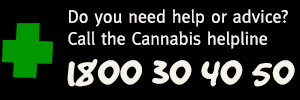How to help
Finding out your child is using drugs, or is even exposed to them, can be a shock. These resources will provide the info you need to help your child understand the risks or start to think about quitting cannabis.


As a parent, you will deal with a lot of different issues as your child becomes a teenager and then an adult - friends, puberty, girlfriends or boyfriends, studying, jobs and careers, just to name a few. One of the issues you hope you never have to deal with is drug use.
Suspecting drug use is one thing - but acting on it is another. First, it is important not to jump to conclusions. What you see as telltale signs of weed use - lack of motivation, withdrawn behaviour, limited social interactions or the like, may all just in fact be signs of puberty or stress at school.
If you have found weed or a bong or other materials in your child's room or bag, or you know their friends smoke, maybe your fears are a bit more realistic, but you never know until you ask! Below are some of the best ways to prepare to confront cannabis use in your teen and to offer them help.
Arm yourself with information
Before jumping into accusations or tricky conversations, make sure you know what you're talking about. Arming yourself with the facts about cannabis, how it is used, the short-term and long-term effects, and the legal consequences of possession will mean you can answer questions with confidence. To get you started, try our Parent's FAQ, our factsheets, or our Weed 101: Marijuana Facts, written especially for young people using weed or thinking about trying it.
Seek help and advice
If you're not confident tackling this issue just yet, try seeking some help or advice. A great first step, is calling our National Cannabis Information and Helpline on 1800 30 40 50. We have trained and specialist counsellors on hand to answer every call, and in addition to offering advice and sharing knowledge and experience, they are great listeners if you just need a vent or to share your situation in confidence.
If you need some face-to-face advice close to home, your GP is a great source of information and can provide insights and advice that will help you start an effective conversation with your kids.
How to approach your teen
Talking about drugs, especially if you're worried your teen may be using, can be quite daunting. Our online or print booklet, What's the deal? Talking with a young person about cannabis, is a really useful resource to help you create a game plan for a productive conversation that doesn't cause drama.
When planning the conversation, make sure you kick it off at a place and time that is comfortable for both of you, and where you won't be cut short. Avoid the car-ride to school or just before bed, as you may have to abruptly end your discussion at a point that could leave one or both of you anxious.
Approach the conversation with an open and calm mind, and make sure you don't set ultimatums, like, 'stop using or leave the house', as you may isolate your child or cause an argument that is difficult to recover from.
If asked questions about your own past, be honest. One of the worst things that can happen is if you lie about trying cannabis in the past and get caught out. Honesty is the best basis for trust and for ongoing conversations.
Listening without judgement and encouraging questions is also a good way to show you are supportive and want to help, without building any animosity. It's also important even if your teen doesn't open up right away, as they will understand that they can approach you at a later time when they feel more comfortable.
Finally, if you feel you can't offer them the help they need, providing ideas like visiting the GP together, just to get some answers to questions, can show them you're willing to stand behind them every step of the way.
Our video series, MAKINGtheLINK Parent Program, conveys the story of one mum and her son who are confronting use, how they deal with it, and how she supports her son as he works through his thoughts and issues towards changing his behaviour.









